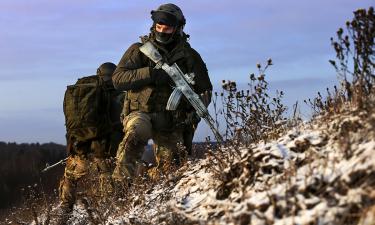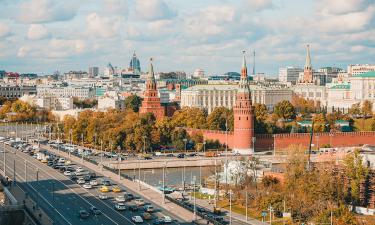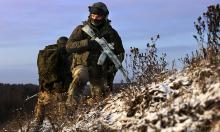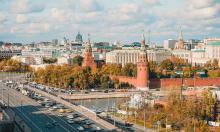Funeral service at Russia's first pet cemetery costs 500 USD and higher
Muscovites who wish to have their cats, dogs, hamsters buried in a civilized way can now use the services provided by Russia’s first pet cemetery located near the city of Khimki, a suburb northwest of Moscow.
The facility was partly put into operation this summer. Only a handful of recesses in the wall of a pet columbarium have been covered with plaques containing sorrowful epitaphs and photos of animals buried inside. The ashes of the deceased are deposited into special wells in the so-called Memory Garden. One can also see a number of neat graves in the Alley of Heroes, a portion of the cemetery allotted for interring purebred cats and dogs.
“We’ve been in operation for only two months so we buried about 50 animals so far,” said Olga Pasyukevich, an executive director of a pet burial services company which runs the facility. “Our first customers included cats, dogs and a couple of rabbits. As a rule, people are greatly saddened at having lost their pets. They burst into tears and weep throughout the ceremony. Owners pay respects to their pets as if the latter were really part of a family. Some can even place a glass of water covered with a slice of bread near the grave,” Pasyukevich added.
“It’s easy to make funeral arrangements with our company. An owner would call us on the phone, and we’d soon send a vehicle to pick up the body of an animal. We would conclude an agreement with an owner for standard burial services and a ceremony to be held in a farewell hall. At an additional charge, we can provide live funeral music, a eulogy or even a wake that would be held in a special room in the office building. To be honest, we haven’t received any requests for a wake so far,” Pasyukovich said. The farewell hall is a clean spacious room equipped with a device for conveying the body of a dead animal into the room. Once the ceremony is over, the body is sent to a funeral home where it is prepared for cremation.
“The bodies of animals are cremated at Ekolog plant,” Pasyukovich said. “Our plant is Russia’s only facility where the deceased pets can be cremated one by one. The cost of an individual pet cremation at the above facility starts at 3,500 rubles (EUR 100) and goes up proportionally to the weight of a pet. “Individual boxes are used for cremating dead animals whose ashes are then placed into numbered urns,” Pasyukovich added.
“In theory, is there any possibility for some criminals to cremate a victim of their crime as a dog at the plant?” I asked the executive director, trying to carefully choose the words.
“It’s absolutely out of the question. Security is tight at the plant. Besides, all the ‘customers’ are subject to close examination prior to cremation. Our personnel at the plant keep count of the bodies bythe kilogram,” Pasyukevich answered.
Incidentally, kilograms come into play when you have to foot the bill. For instance, cremation of a pet weighing from 10 to 30 kilos would cost you 3,500 rubles ($ 137); the same for a pet of 30-50 kilos would cost 4,500 rubles ($176); 50-70 kilos cost 5,000 rubles ($196); 70-90 kilos cost 5,500 rubles ($215). The cremation costs of a pet weighing more than 90 kilos are to be agreed. Quality of a service is guaranteed. The body of a huge horse was professionally cremated at the plant a while ago. The horse’s owner was reportedly issued a small urn containing the aches of her favorite hoofed creature.
Those who are rich and overly bereaved at the same time can order urns made of oak (10,000 rubles or $392 a piece); pinewood urns (6,000 rubles or $235 each) or ceramic urns (from 1,000 rubles or $39 ). Tombstones could cost as mush as 15,000 rubles ($588) a piece.
Cross-shaped and heart-shaped medallions containing ashes can be made to order for those who wish to wear the remains of their pets close to the heart. The price starts at 1,000 rubles ($39).
City dwellers prefer cats
A resent study by ROMIR Monitoring suggests that burial services rendered by the above company in Moscow are likely to be in demand. The survey shows that every other Moscow family (including Muscovites crammed in communal and small-sized apartments) keeps at least one pet.
The survey covered 10,000 residents of major Russian cities. The respondents are 15 years old and older. As it turned out, 48 percent of Russians in the provinces and 45 percent of Muscovites are pet lovers. The survey indicates that big families in particular are fond of pets. Only 43 percent of families comprising five members do not have any pets; 44 percent of four-member families do not have any pets either. Only 28 percent of singles keep cats, dogs, birds or fishes at their homes. A spinster keeping a cat or a bachelor with a big dog – could it be that the story is nothing but an old myth? Well, it is not exactly that black and white. The survey shows that 79 percent of singles who keep pets prefer cats. In case of pets in a Russian household, it makes no difference if their owners are rich or can hardly make both ends meet, they could have lots of children or have no offspring at all. Half of Russian children grow up alongside pets in their homes. A cat is the most popular pet of big city dwellers. Every third pet owner has a dog. Large families tend to keep dogs; 12 percent of dog owners keep more than one dog; 13 percent of cat lovers usually keep more than two animals.
Subscribe to Pravda.Ru Telegram channel, Facebook, RSS!





